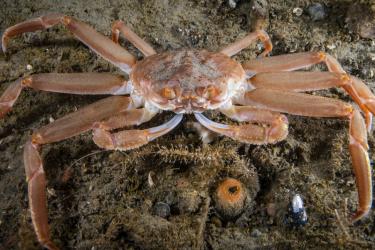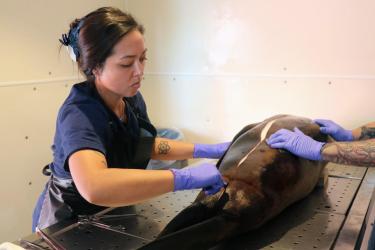What is the integrated survey?
The vision for the Integrated West Coast Pelagics Survey is a robust fisheries-independent survey that collects data that informs sustainable Pacific hake and coastal pelagic fisheries, gathers ecosystem data, and maintains the survey schedule. It integrates two coast-wide surveys into one efficient and economical survey. It will also use the latest advanced technology to sample effectively and employ artificial intelligence/machine learning to streamline data analyses. These technology advances rely heavily on cooperative research and collaboration with industry.
It is an opportunity to ensure we collect the data we need for sustainable fishery management and modernize how we survey, including accounting for evolving oceanic/ecosystem conditions to improve the responsiveness of fisheries management to near-real-time ocean conditions. Notably, an integrated survey maintains the integrity of the coastal pelagic and Pacific hake biomass time series to enhance U.S. domestic seafood production.
The Integrated survey will include one NOAA ship with other chartered industry vessels covering the ocean from Mexico to Canada. It will gather acoustics data, biosampling data, eDNA, and ecosystem data and be coordinated with Canada’s Department of Fisheries and Oceans and Mexico's Instituto Nacional de Pesca to sample in their waters to the extent possible.
Stay Updated
Keep up with the latest survey news. Sign up to receive announcements on upcoming outreach events and other updates.
Data Collection off the West Coast Supports the Pacific Hake and Coastal Pelagic Fisheries
The Pacific hake and coastal pelagic fisheries rely on data collected by NOAA through surveys and from the fisheries themselves. These data are essential for tracking our changing environment and creating accurate stock assessments that ensure these fisheries remain productive and sustainable today and in the future.
Prior to 2025, NOAA Fisheries conducted two fishery-independent surveys to gather data on these crucial West Coast fisheries:
- The Southwest Fisheries Science Center conducted the Coastal Pelagic Species (CPS) Survey annually, occasionally partnering with Mexico's Instituto Nacional de Pesca to sample in their waters
- The Northwest Fisheries Science Center, in partnership with Fisheries and Oceans Canada, conducted the Joint U.S.-Canada Integrated Ecosystem and Pacific Hake Acoustic Trawl Survey (Hake Survey) biennially in odd years and a coordinated hake/ecosystem and survey methods research cruises biennially in even years
The two surveys covered mainly the same ocean areas off the U.S. West Coast. Both used the acoustic-trawl method to provide biomass estimates vital to stock assessments. But, there are differences, including the time of day, depth, and net configuration used to trawl. Further, the surveys were conducted separately by their respective science centers, which have developed working relationships with their corresponding fishing communities.
Drivers for an Integrated Survey
The NOAA ships we rely on for our current surveys will begin major mid-life repairs on a rotating basis for 12–18 months at a time for the next several years, starting in late 2025. Only one of either the hake (NOAA Ship Bell M. Shimada) or CPS (NOAA Ship Reuben Lasker) survey vessels will be available for the next several years. Repair delays or other disruptions to vessel availability could create additional risks to surveying.
A changing ocean ecosystem requires more robust data collection to understand shifts in ecosystem dynamics and their impacts on fisheries to improve the responsiveness of fisheries management to near-real-time ocean conditions.
Building an Integrated Survey
Our solution is to create one integrated survey for the West Coast that ensures we maintain the scientific integrity of the hake and CPS fisheries' biomass time series in the face of a changing ocean. Integrating the surveys gives us more flexibility by creating unified and nimble capabilities, developing resource and process efficiencies, and incorporating the latest technologies into the survey and data analysis. It is also an opportunity for industry experts to weigh in on how the survey can be designed and improved by sharing expertise, proven methods, and technology innovations. We have seen over the years that strong collaboration between NOAA and industry produces better surveys and better data for the fisheries.
Lessons Learned from Past Efforts
Three times in the past eleven years, we combined the two hake and CPS surveys on short notice because of vessel and other issues. Each time, we collected data such that the biomass estimates became part of their respective time series. We are building on past lessons from 2012, 2013, and 2015 to build a stronger approach to an integrated survey.
For example, working with industry, we explored and have completed the design and construction of a single net to catch representative hake and CPS samples. We are thoroughly testing new methods against our past methods, and seeking input from the relevant fishery management processes.
Also, we are coordinating with Fisheries and Oceans Canada and Mexico's Instituto Nacional de Pesca to sample in their waters to the extent possible. And we’re working with several state agencies and the fishing community to continue sampling in nearshore waters using their vessels.
Our teams have experience adapting to bumps in the road to data collection by “working the levers” to make a survey successful. For example, with a loss of sea days on a NOAA vessel, we would look to redirect charter or autonomous vessels and/or adjust the sampling scheme. In evaluating different biosampling methods, we are exploring platform flexibilities and can adapt and test other methods.
Working on the ocean is hard. We want to work with the fishing community and those with diverse on-the-water experiences. Collectively, we are problem-solvers with decades of experience planning and executing fisheries surveys. As part of that experience, we plan for different contingencies and solve issues as they arise, even if unanticipated. We bring all this experience and a commitment to strive for scientific excellence. Further, as we implement the integrated survey, we commit to sharing how things work with you and our management partners.
Timeline of Recent Major Events
September 2023
NOAA Fisheries awarded a contract to supply a multi-function trawl net system with field testing and training. The net system would be able to trawl both midwater and at the surface to facilitate an integrated survey of hake and coastal pelagic fish species.
December 2023
SWFSC and the NWFSC scientists along with industry colleagues tested a newly acquired multi-function trawl system, manufactured by Swan Nets, Seattle, to characterize its midwater and surface-trawling performance. Trawl evaluation tools included a newly upgraded Simrad net mensuration system, and video from in-net cameras and an aerial drone. Various measurements and observations informed iterative refinements to the bridle lengths, tom weights, floats, door-vent openings and bail attachment points. Crew were trained to switch the gear from one trawling mode to the other. Additionally, scientists gained experience to begin developing operational protocols.
Summer 2024
Trawl operations were conducted aboard the NOAA Ship Reuben Lasker to test and refine the configuration and performance of the Multi-Function Trawl net during the first five days of the 2024 California Current Ecosystem survey in June 2024. Lasker also coordinated with drone pilots from the Marine Mammal and Turtle Division to collect aerial footage of the net and provide additional information about deployment and fishing operations. Based on the results of the MFT testing, the crew continued using the new MFT throughout the 2024 CCES survey.
Later, in August, the MFT was tested again aboard the NOAA Ship Bell M. Shimada near San Francisco, CA, with a focus on midwater operations targeting hake and associated species. During 11 trawls, the crew adjusted door configurations and net dimensions to meet survey specifications while gaining hands-on experience with MFT procedures. Deck crew were trained on proper deployment techniques and noted the net’s efficiency and ease of use. Pocket nets used to assess selectivity added about 25 minutes to each trawl, but contributed valuable data for evaluating net performance.
February 2025
NWFSC scientists traveled to Victoria, B.C., with a complete MFT system to train Canadian fisheries researchers aboard the CCGS Sir John Franklin in its operational procedures. This effort supported the Department of Fisheries and Oceans Canada gear trials, aimed at evaluating the MFT system for potential integration into Canadian survey programs and fostering greater alignment in survey methodologies between the United States and Canada.
Also in February, the Pacific Hake Treaty Scientific Review Group reviewed the analysis of MFT performance. The SRG recommended conducting the 2025 Integrated survey using the single MFT gear type and comparing 2025 survey data to previous surveys later in 2025.
March 2025
Scientists from the NWFSC and SWFSC along with industry colleagues sailed aboard NOAA Ship Bell M. Shimada to conduct gear trials in preparation for the summer 2025 Integrated West Coast Pelagics Survey. The aim of the trials was to ensure that the new Multi-Function Trawl net, net mensuration gear, and Shimada crew were all ready and functional for the inaugural integrated survey. This included establishing the optimal deployment configurations for both midwater and surface trawls to achieve efficient operations that collected required data. Despite some rough weather, the team successfully conducted trawls and determined a configuration that will greatly simplify alternating deployments of surface and midwater trawls. The new net mensuration gear also performed well and allowed for real-time feedback confirming desirable fishing operations. Overall, the gear trials were successful and demonstrated readiness for the upcoming integrated survey.
Summer 2025
The inaugural Integrated West Coast Pelagics Survey will take place starting from the U.S.- Mexico border up to the U.S.-Canada border over 3+ months at sea.
We Welcome Your Feedback
How can we make the new integrated survey the most successful? What are the latest advances in net technology that would catch representative size ranges for coastal pelagics and Pacific hake? What other biosampling or observing tools or technologies can we use to improve our understanding of these stocks and how they are affected by a changing ocean? You can share your ideas and thoughts or ask questions anytime using the contact information below. Or you can join us at an upcoming outreach event.
CONTACT US:
NWFSC for Hake:
Craig Russell
Julia Clemons
SWFSC for CPS:
Annie Yau
Kevin Stierhoff


